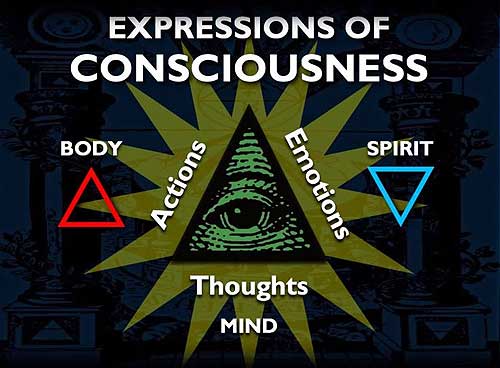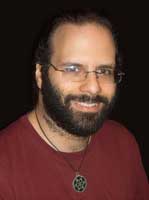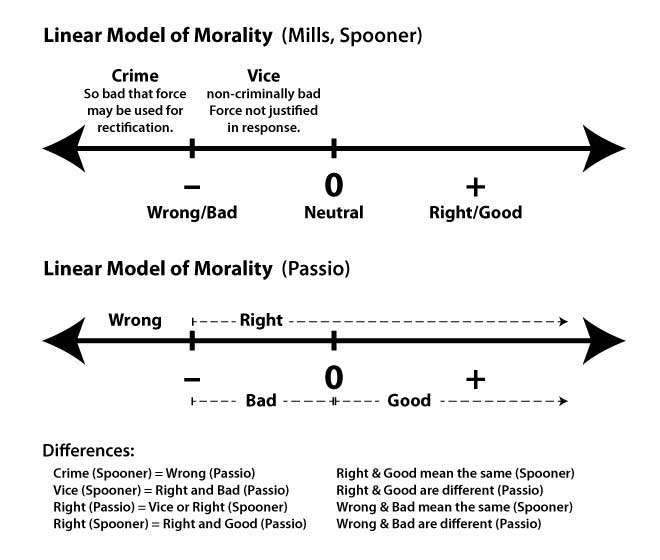Jan 29, 2020
At a sales conference at Random House, preceding the publication of Atlas Shrugged, one of the book salesmen asked me whether I could present the essence of my philosophy while standing on one foot.
I did, as follows:
- Metaphysics: Objective Reality
- Epistemology: Reason
- Ethics: Self-interest
- Politics: Capitalism
- Ayn Rand
Mark Passio’s conception of natural law is based on Ayn Rand’s objectivism, but with several modifications and additions. Passio adopts three out of four of the planks of Rand's objectivism. His metaphysics is straight objectivism. His ethics is egoism - rational self-interest. His politics is free market capitalism. The only significant difference is in epistemology. While Rand harshly criticized religion as anti-mind death worship, Passio embraces a soft form of religion. Rand’s rational empiricism is largely replaced by New Age mysticism. Rand was a hard-core atheist, while Passio is a mystic anti-occultist. Other than that, the two philosophies are remarkably identical. Passio is Ayn Rand in New Age clothing.
Rand’s ideas appeal to ultra-logical “Mr. Spock” types - people who are systemizers rather than empathizers. Passio’s target audience seems to be the New Age and yoga set - people with a “mystical balance” world view, prone to taking undefined terms such as “spirit” seriously. Also, judging from discussions with his disciples, he appeals to those who want a pat set of commandments, rather than deep philosophical explanations. In other words, while Rand derives virtues from rational self-interest and “the life of man qua man,” Passio is satisfied to give a list of “thou shalt nots,” supported more by emotive rhetoric rather than cold reason.
Natural Law - the unseen and universal spiritual laws. which govern the consequences of human behavior. - Passio’s general definition
As an objectivist, I would delete “unseen” and “spiritual.” Ayn and I think that natural law is based on empirical reality and reason, and can be verified empirically. Our version of this would be:
Natural Law - the universal laws which govern the consequences of human behavior. - an alternative definition
Tossing in the buzzwords “unseen” and “spiritual” caters to Passio’s target audience. This is good marketing on Passio's part, but not very rigorous from a philosophical standpoint.
Most of the morning session consists of a very good explanation of objectivist epistemology and a rather suspect occult class struggle conspiracy theory, spiced with frequent interesting etymological diversions, along with a few self-praising ads. Also included were anti-New Age and anti-solipsism rants, and a self-help bit on the steps of problem solving. Passio expands his definition of natural law thusly:
Natural Law -
Universal, non-man-made, binding and immutable conditions that govern the consequences of behavior.
Natural Law is a body of Universal Spiritual Laws which act as the government dynamics of Consciousness. - working definition
The first sentence of the definition is right on the mark. The second sentence is bullshit jargon, and can be omitted from the definition.

In Passio’s “Expressions of Consciousness” model, the Thoughts, Actions, and Emotions triangle makes sense, but not the Body-Mind-Spirit superimposed part. Spirit is still undefined by Passio, and he equates it to emotion - an equivocation incidentally not supported by etymology. The slide shown above is from Passio's presentation, and gives the flavor of his New Age Objectivism.
In his infectious enthusiasm for etymology, Passio at one point overstates the case a bit:
If you don’t understand where words came from, you don’t understand what they really were intended to mean. … The original meaning is derived from its etymological derivation. You need to go into the ancient languages … and break down the word from their etymological origins. Then you will you will understand their real meaning. - [1:18:18 in video]
Some of Passio’s adherents glom onto this and use it as a dictionary fallacy, that is, they claim the One True Meaning of a word is determined by etymology. This is unfortunate, but not Mark Passio’s fault.
In the afternoon session, Passio discusses brain structure and behavior, claiming that it is a masculine-feminine phenomena. Contrary to his thesis, there is no scientific evidence that intellect is masculine and intuition is feminine. (There is, however, evidence that systemizing/empathizing has a masculine/feminine correllation.) Surprisingly, Passio all but admits that his model is satanist dogma. In short, in this part of the lecture he is a bit loose on the science to support his spiritualist masculine-feminine idea.
“Moral relativism - There’s no such thing as right and wrong.” - Passio
This is not the usual definition of moral relativism, but it is the definition of moral skepticism.

Mark Passio
Passio has a list of what he considers false religions. I strongly favor (“rigid”) skepticism and what Passio calls scientism. Surprisingly, Passio comes out of the closet as a full-fledged theist, even spouting some standard theist bromides. (E.g. Argument from design: “If natural law exists, there must be a creator.”)
Passio’s neo-Marxian occult class war theory is that an Evil Overlord Class of elites is conspiring to hide knowledge from the rest of us. He views brain imbalances as being exploited by this Evil Overlord Class. Passio doesn’t actually call it that; he simply alludes to some vague evil power that wants to control people.
Passio demonstrates a common misunderstanding about Darwinism. Like many, he thinks “survival of the fittest” refers to the fittest individual. No, it refers to the fittest genes. Read “The Selfish Gene” for details.
Passio is an entertaining speaker. Sometimes I agree with him; sometimes I don’t. Sometime’s he says something super brilliant.
“The truth will piss you off, and then it will set you free.”
At other times he says something really dumb.
“Determinism is defined by helplessness, religiosity, and the dismissal of free will.”
What a distorted view of determinism! Classic package deal.
Getting back to natural law, we get to Passio’s detailed description.
Eight Principles of Natural Law [with reviewer comments]
- Mentalism - The All is Mind. The Universe is Mental. Thoughts lead to the manifestation of things and events. [But thoughts need action to affect reality.]
- Correspondence - That which is above is like to that which is below. The macro and the micro are “reflections of each other,” i.e. very similar. [Debatable. Is quantum physics that similar to astronomy?]
- Vibration - Nothing Rests. Everything moves.
- Polarity - Everything has a duel nature. Everything has its pair of opposites. Opposites are identical in nature, but different in degree. All paradoxes may be reconciled, at some level.
- Rhythm - Everything flows, out and in. Rhythm compensates.
- Cause and Effect - Every cause has its effect. Every effect has its cause.
- Gender - Mental gender is the state of co-existence between the Masculine and Feminine aspects of the human mind
- The Lost Principle (the encapsulating principle, Generative Principle) - CARE. What we care about on a day-to-day basis acts as the driving force of our thoughts and actions. The heart. What we care enough to put our will behind.
What can a rational empiricist make of this?
- Mentalism: The All is Mind - This seems to endorse solipsism, but we know from the earlier anti-solipsism rant that this is not the case. To make sense, I would have to interpret this as: One’s own mind is one’s ultimate evaluator and sensor of reality. Put more poetically by Janis Ian: “We have no need of a god; each of us is his own.”
- Correspondence - This is mystic New Age bullshit.
- Vibration - This is mystic New Age bullshit.
- Polarity - This is mystic New Age bullshit.
- Rhythm - This is mystic New Age bullshit.
- Cause and Effect - Yes! Back to some solid objectivist ‘A is A’ truth.
- Gender - This is mystic New Age bullshit.
- Generative Principle - “The heart. What we care enough to put our will behind.” Passio is onto something here. If “spirit” is to make any sense to a rational empiricist, then my intuition is that it is something like this generative principle.
In the evening session, Passion talks about his theory of “Natural Law Expressions,” with a short side trips into Satanism. Frankly, this Expressions part of the presentation was not convincing to me. It seemed to be a hodge-podge of theories and ideas at most tangentially connected to Natural Law. Also, the assertion that these claims can only be understood in a pre-set order was questionable. Someone in the audience did question it, but no answer was given as to why that would be the case.
Here is Passio’s Right/Wrong dichotomy chart:
| Right | Wrong |
|---|---|
| Correct Based in Truth |
Incorrect Not based in Truth |
| Moral In Harmony with Natural Law |
Immoral In Opposition to Natural Law |
| Actions based in it do not result in harm to other sentient beings |
Actions based in it result in harm to other sentient beings |
There is an ambiguity here regarding the meaning of “correct based in truth.” Does this mean morally correct, or does it mean that the action was based on factually correct information? Example: If Smith kills Jones because Smith mistakenly believed Jone was attacking him, this might be a morally correct decision but at the same time not based on correct information. E.g. Jones was playing paintball with a realistic-looking weapon and aimed in Smith’s direction.
A more serious flaw is the use of "harm" when it has not been defined. If this third criteria is meant to be a guide to intuition rather than a serious description, then it should be so noted. As it is, some of Passio's acolytes tend to use "harm" as if it were a precisely defined term. More will be said about this later.
A seeming error is Passio’s equivocation of ‘right (noun) a moral claim to freedom of action’ with ‘right (adj) morally correct.’ However, upon closer examination one sees that these two are actually the same given Passio’s unusual definition of “wrong.”
I suspect that the unusual rendering of the words “right” and “wrong” account for much of the confusion experienced by people who hear someone describing Passio’s theory of natural law. The normal understanding of right and wrong is linear. Some actions are better or worse than other actions, and we imagine we can rank possible actions according to goodness and badness. We consider an action good if it ranks above a zero neutral point, and bad if it scores below neutral. Colloquially “right” and “good” are synonymous, as are “wrong” and “bad.” If something is very bad, then we call it a crime. If something is only moderately bad, we call it a vice. We will call this the Mill-Spooner model, after John Stuart Mill (On Liberty) and Lysander Spooner (Vices are not Crimes).
In Passio’s terminology, a crime is called a transgression; "right" means not a transgression, and "wrong" means a transgression was committed. Since people have a right to do anything non-criminal according to libertarian morality, it follows that any action that is right to do is also a right, and conversely, any right is a right action to do. This differs from the Mill/Spooner terminology, where one has a right to do wrong; Just because something is a general moral right doesn’t mean that it is necessarily right to do, e.g. shoot heroin. It just means that others should not attack you because of it.

While Passio’s transgression seems to be equivalent to the libertarian concept of aggression, the approach taken in justifying this linchpin concept is very different. Libertarians define aggression (as the non-consensual initiation of force or the threat of it) and then deduce from that definition which actions are crimes, i.e. violate the non-aggression principle. In short, libertarians start with a general definition, and take a deductive approach. Passio, on the other hand, takes a fixed list of wrongful actions as the definition of “transgression.” The religious connotation of the word "transgression" is appropriate, since the wrongness of the acts are to be taken on faith, like the Ten Commandments or some other "revealed" doctrine.
Natural Law Transgressions
- murder/assault
- rape
- theft
- trespass
- coercion - “forcing somebody through the threat of violence”
Passio asserts that all transgressions are actions which cause harm. Although he is probably using the idea of harm as intuitive support for the items in the list, he does not define them in terms of harm. It would be improper to do so, since a definition of “harm” has not been stipulated, and normal definitions of harm are too vague and subjective to produce the list. Be aware that some Passio acolytes make the error of using “harm” as if it were a well defined term, sometimes even claiming that the listed transgressions are the only possible harm-causing acts. This can lead to circular definitions, i.e. transgressions are the listed wrongdoings, the listed wrongdoings cause harm, and harm is committing any transgression.
Passio himself makes a similar error. He claims that all the transgressions are a form of theft. This is supported more by intuition than by logic, since one must define what one means by "property" before one can know what theft is. It is poetic to call murder "life theft" and speak of coercion as "theft of freedom," but literally those descriptions do not hold up. I would contend that if one defines "property" broadly enough to cover all transgressions, then that notion of property would violate entitlement property theory. E.g. It would be hard to come up with a definition of property that included freedom, but did not include intellectual property and a property right in social trust or not seeing ugly people wear spandex. I would say that one can lose freedom, but since freedom is not property, it cannot be stolen.
Lying may or may not be a transgression, depending on circumstances. “I would consider that a theft of truth,” Passio says. It is clearly a transgression if it amounts to theft, that is, if a title has been transferred (conditionally or not), but not if it is merely a bald promise. Passio says, “No government has a right to coerce you, but you do have an obligation to abide by your agreements, or to suffer the consequences.” Thus, he seems to concur with Rothbard’s title transfer theory of contract.
All in all, Passio’s lecture series is educational and entertaining. You will likely not agree with everything he says, but he has some good ideas and some interesting notions. The objectivist epistemology and egoist ethic is the strongest part of the presentation. Some of the New Age stuff is a bit ‘out there,’ but he’s a former Satanist high priest so what do you expect? Overall grade: B. Points lost for lack of philosophical rigor. No tits, no buckets of blood, but a lot of wisdom. Billy Bob sez check it out.
Passio's Natural Law Seminar full video.
